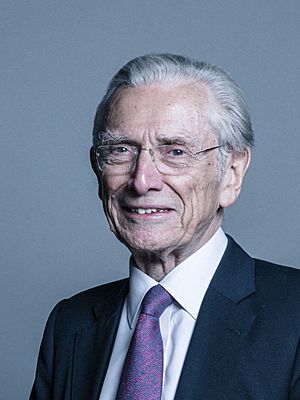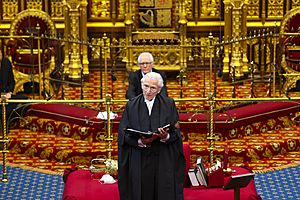Norman Fowler, Baron Fowler facts for kids
Quick facts for kids
The Lord Fowler
|
|||||||||||||||||||||||||||
|---|---|---|---|---|---|---|---|---|---|---|---|---|---|---|---|---|---|---|---|---|---|---|---|---|---|---|---|

Official portrait, 2018
|
|||||||||||||||||||||||||||
| Lord Speaker | |||||||||||||||||||||||||||
| In office 1 September 2016 – 30 April 2021 |
|||||||||||||||||||||||||||
| Monarch | Elizabeth II | ||||||||||||||||||||||||||
| Deputy | The Lord McFall of Alcluith | ||||||||||||||||||||||||||
| Preceded by | The Baroness D'Souza | ||||||||||||||||||||||||||
| Succeeded by | The Lord McFall of Alcluith | ||||||||||||||||||||||||||
|
|||||||||||||||||||||||||||
| Chairman of the Conservative Party | |||||||||||||||||||||||||||
| In office 11 May 1992 – 15 July 1994 |
|||||||||||||||||||||||||||
| Leader | John Major | ||||||||||||||||||||||||||
| Preceded by | Chris Patten | ||||||||||||||||||||||||||
| Succeeded by | Jeremy Hanley | ||||||||||||||||||||||||||
| Secretary of State for Employment | |||||||||||||||||||||||||||
| In office 13 June 1987 – 3 January 1990 |
|||||||||||||||||||||||||||
| Prime Minister | Margaret Thatcher | ||||||||||||||||||||||||||
| Preceded by | The Lord Young of Graffham | ||||||||||||||||||||||||||
| Succeeded by | Michael Howard | ||||||||||||||||||||||||||
| Secretary of State for Social Services | |||||||||||||||||||||||||||
| In office 14 September 1981 – 13 June 1987 |
|||||||||||||||||||||||||||
| Prime Minister | Margaret Thatcher | ||||||||||||||||||||||||||
| Preceded by | Patrick Jenkin | ||||||||||||||||||||||||||
| Succeeded by | John Moore | ||||||||||||||||||||||||||
| Secretary of State for Transport | |||||||||||||||||||||||||||
| In office 4 May 1979 – 14 September 1981 |
|||||||||||||||||||||||||||
| Prime Minister | Margaret Thatcher | ||||||||||||||||||||||||||
| Preceded by | Bill Rodgers | ||||||||||||||||||||||||||
| Succeeded by | David Howell | ||||||||||||||||||||||||||
|
|||||||||||||||||||||||||||
|
|||||||||||||||||||||||||||
| Personal details | |||||||||||||||||||||||||||
| Born |
Peter Norman Fowler
2 February 1938 Chelmsford, Essex, England |
||||||||||||||||||||||||||
| Political party | Crossbench | ||||||||||||||||||||||||||
| Other political affiliations |
Conservative (until 2016) Speaker (2016–2021) |
||||||||||||||||||||||||||
| Spouse |
Fiona Poole
(m. 1979) |
||||||||||||||||||||||||||
| Children | 2 | ||||||||||||||||||||||||||
| Alma mater | Trinity Hall, Cambridge | ||||||||||||||||||||||||||
Peter Norman Fowler, Baron Fowler (born 2 February 1938) is a British politician. He was an important member of the government, called the Cabinet, when Margaret Thatcher and John Major were Prime Ministers. He was also the Lord Speaker from 2016 to 2021, which is like being the chairperson for the House of Lords.
As a government minister, Lord Fowler made two very important changes. First, as Minister of Transport, he passed the law that made wearing seat belts in cars mandatory. Later, as Secretary of State for Social Services, he started a major public health campaign to teach people about the dangers of AIDS.
He was knighted in 1990. In 2001, he became a life peer, which means he became a member of the House of Lords for life. He left his role as Lord Speaker in 2021 so he could spend more time on his campaign work, especially related to AIDS awareness.
Contents
Early Life and Education
Peter Norman Fowler was born in Chelmsford, Essex, on 2 February 1938. He was an only child. He went to King Edward VI Grammar School in his hometown.
After finishing school, he served in the Essex Regiment of the British Army. He then went to Trinity Hall, Cambridge, where he studied Economics and Law. At university, he became interested in politics and was the chairman of the student Conservative Association. After graduating, he worked as a journalist for The Times newspaper.
Becoming a Politician
Fowler wanted to be a Member of Parliament (MP) since he was a child. In 1970, he was elected to represent the area of Nottingham South. When that area's boundaries were changed, he was elected as the MP for Sutton Coldfield in 1974. He would continue to represent this area until 2001.
In the mid-1970s, when his party was not in power, Fowler served as the Shadow Minister of Transport. This meant his job was to be an expert on transport and challenge the government's decisions.
Working in the Government
When Margaret Thatcher became Prime Minister in 1979, she made Fowler the Minister of State for Transport. He attended all the important government meetings, even though he wasn't an official member of the Cabinet at first.
Making Seat Belts Mandatory
As Secretary of State for Transport, one of Fowler's biggest achievements was making it a law for people to wear seat belts. The law was passed in 1981 and came into effect in 1983. This decision has saved thousands of lives over the years.
Raising Awareness About AIDS
In the 1980s, Fowler became the Secretary of State for Social Services. During this time, a new and dangerous disease called AIDS was becoming a major health crisis. Fowler led the UK's first major campaign to educate the public about it.
The government used posters, TV ads, and newspaper articles to spread information. A famous part of the campaign was a leaflet called "Don't Die of Ignorance", which was sent to every home in the country. Thanks to this campaign, almost everyone in the UK learned about the disease. This helped slow down its spread in the UK compared to other countries.
Some people, including Prime Minister Thatcher, were worried that the campaign was too direct. But Fowler believed it was necessary to be honest to protect public health. The next year, he was moved to a new role as Secretary of State for Employment.
Later Career and House of Lords
In 1990, Fowler decided to leave his senior government role. He said he wanted to spend more time with his family and young children. He was the first major politician to give this reason for resigning. After leaving the Cabinet, he was knighted by the Queen for his service.
He later returned to important political jobs, including being Chairman of the Conservative Party from 1992 to 1994. In 2001, he retired as a Member of Parliament.
After leaving the House of Commons, he was made a life peer and given the title Baron Fowler. This allowed him to sit in the House of Lords, the second house of the UK Parliament. In the Lords, members use their experience to check and improve laws.
In 2016, he was elected Lord Speaker, the person in charge of debates in the House of Lords. He supported the idea of reducing the number of members in the House of Lords to make it more efficient.
He stepped down as Lord Speaker in April 2021. He said he wanted to be free to speak out on issues he cared about, especially supporting people affected by HIV and AIDS.
Personal Life
Fowler married Fiona Poole in 1979. Together, they have two daughters. Fowler is also a stepfather to his wife's son from a previous marriage. He is a member of the National Union of Journalists.
See also
 In Spanish: Norman Fowler para niños
In Spanish: Norman Fowler para niños


